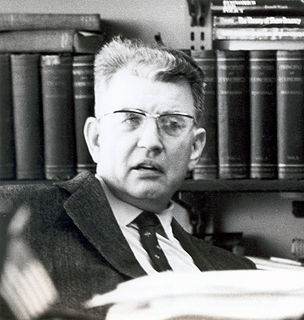This page is based on this
Wikipedia article Text is available under the
CC BY-SA 4.0 license; additional terms may apply.
Images, videos and audio are available under their respective licenses.

Ronald Harry Coase was a British economist and author. He was the Clifton R. Musser Professor of Economics at the University of Chicago Law School, where he arrived in 1964 and remained for the rest of his life. He received the Nobel Memorial Prize in Economic Sciences in 1991.

Business is the activity of making one's living or making money by producing or buying and selling products. Simply put, it is "any activity or enterprise entered into for profit. It does not mean it is a company, a corporation, partnership, or have any such formal organization, but it can range from a street peddler to General Motors."
Environmental economics is a sub-field of economics that is concerned with environmental issues. It has become a widely studied topic due to growing concerns in regards to the environment in the twentyfirst century. Quoting from the National Bureau of Economic Research Environmental Economics program:
... Environmental Economics ... undertakes theoretical or empirical studies of the economic effects of national or local environmental policies around the world .... Particular issues include the costs and benefits of alternative environmental policies to deal with air pollution, water quality, toxic substances, solid waste, and global warming.

An economist is a practitioner in the social science discipline of economics.
Laissez-faire is an economic system in which transactions between private parties are free from government intervention such as regulation, privileges, tariffs and subsidies. The phrase laissez-faire is part of a larger French phrase and literally translates to "let (it/them) do", but in this context usually means "let go".
Classical economics or classical political economy is a school of thought in economics that flourished, primarily in Britain, in the late 18th and early-to-mid 19th century. Its main thinkers are held to be Adam Smith, Jean-Baptiste Say, David Ricardo, Thomas Robert Malthus, and John Stuart Mill. These economists produced a theory of market economies as largely self-regulating systems, governed by natural laws of production and exchange.
Law and economics or economic analysis of law is the application of economic theory to the analysis of law that began mostly with scholars from the Chicago school of economics. Economic concepts are used to explain the effects of laws, to assess which legal rules are economically efficient, and to predict which legal rules will be promulgated.
The following outline is provided as an overview of and topical guide to commercial law:
Unfair competition in commercial law is a deceptive business practice that causes economic harm to other businesses or to consumers. It includes a number of areas of law involving acts by one competitor or group of competitors which harm another in the field, and which may give rise to criminal offenses and civil causes of action.

Heterodoxy is a term that may be used in contrast with orthodoxy in schools of economic thought or methodologies, that may be beyond neoclassical economics. Heterodoxy is an umbrella term that can cover various schools of thought or theories. These might for example include anarchist, socialist, Marxian, institutional, evolutionary, Georgist, Austrian, feminist, social, post-Keynesian, and ecological economics among others.
New institutional economics (NIE) is an economic perspective that attempts to extend economics by focusing on the social and legal norms and rules that underlie economic activity and with analysis beyond earlier institutional economics and neoclassical economics. It can be seen as a broadening step to include aspects excluded in neoclassical economics. It rediscovers aspects of classical political economy.

Thermoeconomics, also referred to as biophysical economics, is a school of heterodox economics that applies the laws of statistical mechanics to economic theory. Thermoeconomics can be thought of as the statistical physics of economic value and is a subfield of econophysics.
Broadly, geoeconomics is the study of the spatial, temporal, and political aspects of economies and resources. The formation of geoeconomics as a branch of geopolitics is often attributed to Edward Luttwak, an American economist and consultant, and Pascal Lorot, a French economist and political scientist. Azerbaijani economist Vusal Gasimli defines geo-economics as the study of the interrelations of economics, geography and politics in the "infinite cone" rising from the center of the earth to outer space.
The following outline is provided as an overview of and topical guide to economics:
Kuwait follows the "civil law system" modeled after the French legal system, Kuwait's legal system is largely secular. Sharia law governs only family law for Muslim residents, non-Muslims in Kuwait have a secular family law. For the application of family law, there are three separate court sections: Sunni, Shia and non-Muslim.
Constitutional economics is a research program in economics and constitutionalism that has been described as explaining the choice "of alternative sets of legal-institutional-constitutional rules that constrain the choices and activities of economic and political agents". This extends beyond the definition of "the economic analysis of constitutional law" and is distinct from explaining the choices of economic and political agents within those rules, a subject of orthodox economics.
This glossary of economics is a list of definitions of terms and concepts used in economics, its sub-disciplines, and related fields.





